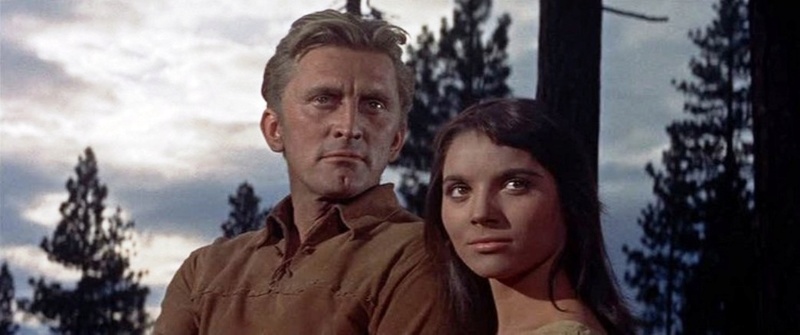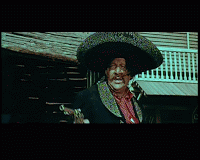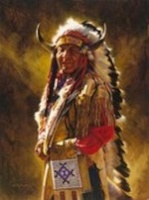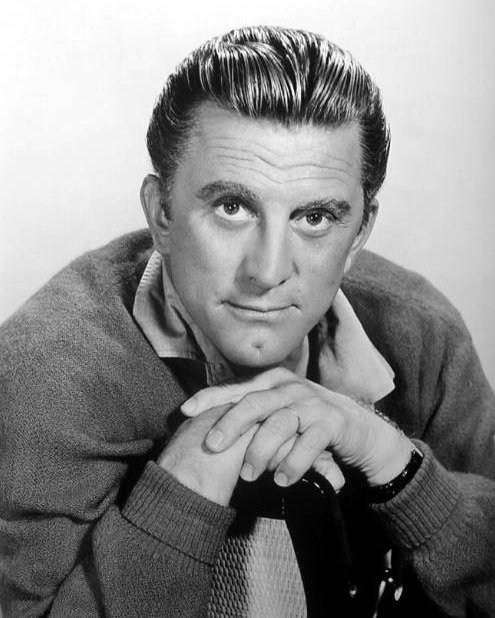Kirk Douglas
+2
old timer
Rex Lee
6 participants
Page 1 sur 1
 Kirk Douglas
Kirk Douglas

Kirk Douglas (ci-dessus dans La Rivière de nos amours) est né le 9 décembre 1916.
100 ans la semaine prochaine!
_________________

Dis-donc, toi, tu sais que tu as la tête de quelqu’un qui vaut 2000 dollars?

Rex Lee- Sergio Leone
- Messages : 6429
Date d'inscription : 06/04/2010
Age : 68
Localisation : 19
 Re: Kirk Douglas
Re: Kirk Douglas
...grande figure du western US, du films d'aventures, mais n'oublions pas son escapade en Italie dès les années 50:


old timer- Sergio Leone
- Messages : 1889
Date d'inscription : 20/05/2010
 Re: Kirk Douglas
Re: Kirk Douglas
...ça y est, c'est le grand jour ! 100 ans au compteur !
Le dernier des géants, et pour cause !
Le dernier des géants, et pour cause !
old timer- Sergio Leone
- Messages : 1889
Date d'inscription : 20/05/2010
 Re: Kirk Douglas
Re: Kirk Douglas
Seule ARTE semble avoir voulu marquer le coup:
diffusion dimanche 18 du célèbre "Les Vikings"
...suivi hier soir de "L'homme qui n'a pas d'étoile' et "Seuls sont les indomptés" ! Très bon choix !
diffusion dimanche 18 du célèbre "Les Vikings"
...suivi hier soir de "L'homme qui n'a pas d'étoile' et "Seuls sont les indomptés" ! Très bon choix !
old timer- Sergio Leone
- Messages : 1889
Date d'inscription : 20/05/2010
 Re: Kirk Douglas
Re: Kirk Douglas
TCM a diffusé une "intégrale" (19 films) de l'acteur tout ce mois de décembre. Certains seront rediffusés jusque début janvier. Ce n'est pas un hasard de calendrier... 
Bon, après, faut avoir accès à cette chaine (qui était gratuite sur Free jusqu'à hier... hélas, c'est fini ).
).
Bon, après, faut avoir accès à cette chaine (qui était gratuite sur Free jusqu'à hier... hélas, c'est fini
_________________
Quand on tire, on raconte pas sa vie...
 Re: Kirk Douglas
Re: Kirk Douglas

Spartacus (1960)

Le Reptile (1970)

Un homme à respecter (1972)
Dirigé notamment par Tourneur, Walsh, Wilder, Hawks, Vidor, Minnelli, Sturges, Kubrick, Aldrich, Huston, Anthony Mann, René Clément, Mankiewicz, Martin Ritt, Preminger, Kazan, lui-même et ...Michele Lupo.
Pas mal, non?
_________________

Dis-donc, toi, tu sais que tu as la tête de quelqu’un qui vaut 2000 dollars?

Rex Lee- Sergio Leone
- Messages : 6429
Date d'inscription : 06/04/2010
Age : 68
Localisation : 19
 Re: Kirk Douglas
Re: Kirk Douglas
Il nous a quittés cette nuit à l'âge de 103 ans.
Cette fois les médias n'exagèrent pas, c'est vraiment la dernière grande star de l'âge d'or d'Hollywood... comme on le sait bien par ici. Sa filmo très diversifiée comprend nombre de films majeurs et mémorables qu'on ne lassera pas de revoir, que ce soit dans le film noir, l'aventure, le peplum, le mélodrame, le film de guerre et bien sûr le western.
Adieu Issur Danielovitch Demsky, bravo et merci pour tout !
Cette fois les médias n'exagèrent pas, c'est vraiment la dernière grande star de l'âge d'or d'Hollywood... comme on le sait bien par ici. Sa filmo très diversifiée comprend nombre de films majeurs et mémorables qu'on ne lassera pas de revoir, que ce soit dans le film noir, l'aventure, le peplum, le mélodrame, le film de guerre et bien sûr le western.
Adieu Issur Danielovitch Demsky, bravo et merci pour tout !
Dernière édition par old timer le Jeu 6 Fév - 12:09, édité 1 fois
old timer- Sergio Leone
- Messages : 1889
Date d'inscription : 20/05/2010

Edocle- Sergio Leone
- Messages : 3743
Date d'inscription : 06/04/2010
Age : 78
Localisation : 92 Spaghetti Ville
 Re: Kirk Douglas
Re: Kirk Douglas
C'était lui le dernier des géants...une légende vivante vient de tirer sa révérence.
RIP.
RIP.
_________________

Dis-donc, toi, tu sais que tu as la tête de quelqu’un qui vaut 2000 dollars?

Rex Lee- Sergio Leone
- Messages : 6429
Date d'inscription : 06/04/2010
Age : 68
Localisation : 19
 Re: Kirk Douglas
Re: Kirk Douglas
J’ai jeté un œil aux articles de presse généraliste, c’est assez affligeant de voir que pour le situer, la plupart commencent par dire que c’etait le père de Michael Douglas!
Certes les générations passent, et Michael est bien connu des jeunes pour apparaître dans des films Marvel, mais on semble tenir pour evident qu’ils ne sont pas cinéphiles pour un sou, qu’il leur est impensable de regarder un film de plus de 30 ans d’âge, et c’est simplement affolant de tenir ce désastre pour acquis !
Certes les générations passent, et Michael est bien connu des jeunes pour apparaître dans des films Marvel, mais on semble tenir pour evident qu’ils ne sont pas cinéphiles pour un sou, qu’il leur est impensable de regarder un film de plus de 30 ans d’âge, et c’est simplement affolant de tenir ce désastre pour acquis !
old timer- Sergio Leone
- Messages : 1889
Date d'inscription : 20/05/2010
 RIP Kirk Dlouglas (1916 - 2020)
RIP Kirk Dlouglas (1916 - 2020)
https://variety.com/2020/film/news/kirk-douglas-dead-dies-spartacus-1203494437/
Kirk Douglas, Legendary ‘Spartacus’ Star, Dies at 103
Variety
By Richard Natale
2/5/2020
Kirk Douglas, the dimple-chinned “Spartacus” star with the larger-than-life persona, died Wednesday. He was 103.
He was the father of actor Michael Douglas and paterfamilias of a Hollywood family that included his sons, producers Joel and Peter and grandson Cameron Douglas.
Michael Douglas posted about his father on Instagram, saying, “It is with tremendous sadness that my brothers and I announce that Kirk Douglas left us today at the age of 103.”
As an actor, Douglas excelled in playing men fighting for their honor (“Spartacus,” “Seven Days in May”) and cocky protagonists who were sometimes likable (“20,000 Leagues Under the Sea”) and sometimes hateful (“Champion,” “The Bad and the Beautiful”). Oscar-nommed three times, he was awarded an honorary Oscar in 1996.
With his clenched throat and intense volatility, he was an easy target for comic impressionists. But his big, macho persona sometimes made people forget his subtle sensitivity in films like “Lust for Life,” “Paths of Glory” and “Lonely Are the Brave.”
Along with his longtime friend and occasional co-star Burt Lancaster, he personified the image of the manly man, a tough guy with flashes of style and humor. Though he wasn’t prolific as a producer, he was responsible for intelligent and offbeat fare including two great films directed by Stanley Kubrick, “Paths of Glory” and “Spartacus.”
Offscreen, Douglas had a reputation for being demanding during his heyday in the ’50s and ’60s. But there were other sides to him as well: a political activist, charity benefactor, family man, a funny and thoughtful storyteller and an author.
Douglas is credited with helping break the 1950s blacklist when he insisted that Dalton Trumbo (one of the Hollywood 10) be credited for his screenplay on the film “Spartacus.” (Trumbo had written a number of scripts during the ’50s, but always under pseudonyms. Douglas insisted on WGA arbitration to get Trumbo credit in 1960, while earlier that year, Otto Preminger announced that Trumbo had scripted “Exodus.”) Douglas was honored by the ACLU with a Bill of Rights Award “for having the courage and conviction to break the infamous Hollywood blacklist and forcing the full recognition of one of its victims.”
Born Issur Danielovitch (later changed to Demsky) in Amsterdam, N.Y., Douglas was the only son of Russian Jewish immigrants. In his autobiography “The Ragman’s Son,” he described the abject poverty in which he was raised. “Even on Eagle Street, the poorest section of town … the ragman was on the lowest rung on the ladder. And I was the ragman’s son.”
With help from loans and scholarships, Douglas attended St. Lawrence U., where, between wrestling matches, he took an interest in dramatics. He worked odd jobs after college — usher, professional wrestler, soda jerk — to pay his way through the American Academy of Dramatic Arts. It was at AADA that he met Diana Dill, who became his first wife and the mother of sons Michael and Joel.
After working in summer stock, Douglas made his Broadway debut in 1941 as a singing Western Union messenger in “Spring Again.”
During his WWII stint in the Navy, Douglas was hit with amoebic dysentery and honorably discharged in June 1944.
He returned to Broadway — he’d had a walk-on role before the war — replacing Richard Widmark in the comedy “Kiss and Tell” and the drama “Trio.” He had to drop out of the original production of the musical “On the Town,” citing “psychosomatic laryngitis.”
On the recommendation of a classmate, Lauren Bacall, he was auditioned and signed by producer Hal Wallis at $500 a week. He made his film bow opposite Barbara Stanwyck in “The Strange Love of Martha Ivers,” after which he returned briefly to Broadway to appear in Sam and Bella Spewack’s farce “Woman Bites Dog.”
Wallis loaned him out for “Mourning Becomes Electra” and the film noir “Out of the Past.” On “I Walk Alone,” co-starring Lancaster, Douglas clashed with Wallis. According to the actor, “This was the beginning of my reputation for being difficult.”
Rather than reup with Wallis for another seven years at Paramount, Douglas decided to freelance, appearing in Fox’s sophisticated Joseph Mankiewicz comedy “A Letter to Three Wives,” among other films.
The film that catapulted him to stardom, and forever cast him as a brooding, explosive personality, was 1949’s “Champion.” For his performance as an unscrupulous boxer he gained his first Academy Award nomination.
That led to a seven-year deal with Warner Bros., where he appeared in “Young Man With a Horn” and “The Glass Menagerie” (in an affable role as the Gentleman Caller).
Established as a star, Douglas scored several major acting triumphs over the next few years. For RKO he toplined Howard Hawks’ Western “The Big Sky.” At Paramount he appeared as an immoral reporter in Billy Wilder’s acidic “The Big Carnival” (aka “Ace in the Hole”) and as a nakedly ambitious police detective in “Detective Story.”
Jumping over to MGM, he notched his second Oscar nom as the monomaniacal producer in Vincente Minnelli’s 1952 “The Bad and the Beautiful.”
He and Diana had divorced in 1951, but while working in Europe on such films as “The Juggler” and “Ulysses,” Douglas met publicist Anne Buydens, whom he married in 1954. They had two sons, Peter and Eric. That same year, he scored another triumph in Disney’s “20,000 Leagues Under the Sea.” In 1955 he founded his own production company, Bryna (named after his mother).
Minnelli said Douglas was “the only choice” to play Vincent Van Gogh in “Lust for Life,” for which the actor picked up his third Oscar nomination. The 1956 film was not a commercial success, but the next year, “Gunfight at the OK Corral” was a hit.
Also in 1957, he gave one of the top performances of his career in “Paths of Glory,” produced by Bryna and directed by relative novice Stanley Kubrick. “It was a truly great film with a truly great theme: the insanity and brutality of war,” Douglas wrote in his autobiography. “As I had predicted, it made no money.”
After producing the successful but critically panned “The Vikings,” Douglas hired Kubrick for “Spartacus,” replacing Anthony Mann two weeks into production. Kubrick distanced himself from the Roman epic, which is nonetheless considered one of the best of its kind.
“I think one of the most important things in my career was the breaking of the blacklist,” Douglas said of his insistence that Trumbo’s name be listed as scenarist for “Spartacus.” Otto Preminger in January 1960 had listed Trumbo’s name for screenplay adaptation on “Exodus” that same year, credited in Variety as being the first producer to do so. Also in 1960, the European film “Blind Date” was distributed by Paramount, with the director (Joseph Losey) and writer getting onscreen credit.
Douglas and many critics consider the modern-day Western “Lonely Are the Brave” (which he also produced) to be one of his finest moments. Also written by Trumbo, it was not a commercial success, nor was his next effort for Minnelli, “Two Weeks in Another Town.”
In 1964 Douglas starred with Burt Lancaster in one of the great political thrillers of the 1960s, John Frankenheimer’s “Seven Days in May.”
A year earlier he had returned to the stage in “One Flew Over the Cuckoo’s Nest,” Dale Wasserman’s adaptation of the Ken Kesey novel, which he tried valiantly to get made into a film over the next decade. His son, Michael, finally succeeded. But by then Kirk Douglas was too old for the role of McMurphy, which was played by Jack Nicholson.
e novel, recalled, “I made more money from that film than any I acted in. And I would gladly give back every cent, if I could have played that role.”
His roles during the ’70s included Joseph L. Mankiewicz’s “There Was a Crooked Man” and the horror thriller “The Fury.” (He turned down “Patton” and a co-starring role in the first Rambo film, “First Blood”). In the early ’70s he directed “Scalawag” and “Posse,” neither of which turned his career around.
Douglas made his TV debut in 1973’s “Dr. Jekyll and Mr. Hyde,” in which he insisted on doing the famous transformation scene without special effects. Subsequent TV appearances included “Victory at Entebbe,” “The Moneychangers,” “Amos,” “Inherit the Wind” and a miniseries adaptation of Michael Korda’s “Queenie.”
In 1981, he toured in “The Boys in Autumn,” co-starring Lancaster (with whom he appeared in films including “Seven Days in May” and “The List of Adrian Messenger”), but left the play before it came to Broadway. They reunited for the last time in the 1986 heist comedy “Tough Guys.”
After penning “Ragman’s Son,” Douglas wrote several more books, including “Dance with the Devil,” “Let’s Face It — 90 Years of Living, Loving, and Learning” in 2007 and “I Am Spartacus!: Making a Film, Breaking the Blacklist,” about the making of “Spartacus,” in 2012.
In 1991, he was honored with the AFI Lifetime Achievement Award, and by the Writers Guild of America for breaking the blacklist. Early that year, Douglas had a close brush with death after he was injured in the collision of a helicopter in which he was a passenger and a stunt plane.
He suffered a stroke in 1995 and had to teach himself to speak all over again. He was left with some paralysis in his face. Self-conscious about his now-slurred speech, he avoided public appearances for months and did not appear in another film until 1999’s “Diamonds,” then took four more years before fulfilling a longtime dream by performing with son Michael, ex-wife Diana and grandson Cameron in “It Runs in the Family.” Rather than use the pic as a farewell, though, he stepped into the lead in an indie pic, “The Illusion.”
And after his public shyness, Douglas embraced his new role as an unofficial spokesman for stroke victims, penning and appearing in a one-man show, “Before I Forget,” in 2009, and accepting speaking engagements, such as the AFI Lifetime Achievement Award ceremony for Michael in 2010, an AFI luncheon in early 2011 (“Kirk Douglas steals the show” was the New York Times headline) and presenting best supporting actress Oscar at Academy Awards that year to Melissa Leo, milking his laughs and flirting with her.
In July 2012, Douglas and his wife Anne announced a total of $50 million in pledges to five nonprofit organizations through the Douglas Foundation, founded by the couple in 1964. They also sponsored more than 240 playgrounds around Southern California.
Douglas and his wife Anne donated millions for the construction of the Kirk Douglas Care Pavilion at the Motion Picture & Television Fund for residents with Alzheimer’s. Funds were also donated to the Anne Douglas Center for Women at the Los Angeles Mission; the Center Theater Group’s Kirk Douglas Theater in Culver City; Sinai Temple in Westwood; and the Kirk Douglas Scholarship fund at Douglas alma mater St. Lawrence U.
Survivors include his wife Anne; three sons: actor-producer Michael and producers Joel and Peter; and at least seven grandchildren. His youngest son, Eric, died in July 2004.
Kirk Douglas, Legendary ‘Spartacus’ Star, Dies at 103
Variety
By Richard Natale
2/5/2020
Kirk Douglas, the dimple-chinned “Spartacus” star with the larger-than-life persona, died Wednesday. He was 103.
He was the father of actor Michael Douglas and paterfamilias of a Hollywood family that included his sons, producers Joel and Peter and grandson Cameron Douglas.
Michael Douglas posted about his father on Instagram, saying, “It is with tremendous sadness that my brothers and I announce that Kirk Douglas left us today at the age of 103.”
As an actor, Douglas excelled in playing men fighting for their honor (“Spartacus,” “Seven Days in May”) and cocky protagonists who were sometimes likable (“20,000 Leagues Under the Sea”) and sometimes hateful (“Champion,” “The Bad and the Beautiful”). Oscar-nommed three times, he was awarded an honorary Oscar in 1996.
With his clenched throat and intense volatility, he was an easy target for comic impressionists. But his big, macho persona sometimes made people forget his subtle sensitivity in films like “Lust for Life,” “Paths of Glory” and “Lonely Are the Brave.”
Along with his longtime friend and occasional co-star Burt Lancaster, he personified the image of the manly man, a tough guy with flashes of style and humor. Though he wasn’t prolific as a producer, he was responsible for intelligent and offbeat fare including two great films directed by Stanley Kubrick, “Paths of Glory” and “Spartacus.”
Offscreen, Douglas had a reputation for being demanding during his heyday in the ’50s and ’60s. But there were other sides to him as well: a political activist, charity benefactor, family man, a funny and thoughtful storyteller and an author.
Douglas is credited with helping break the 1950s blacklist when he insisted that Dalton Trumbo (one of the Hollywood 10) be credited for his screenplay on the film “Spartacus.” (Trumbo had written a number of scripts during the ’50s, but always under pseudonyms. Douglas insisted on WGA arbitration to get Trumbo credit in 1960, while earlier that year, Otto Preminger announced that Trumbo had scripted “Exodus.”) Douglas was honored by the ACLU with a Bill of Rights Award “for having the courage and conviction to break the infamous Hollywood blacklist and forcing the full recognition of one of its victims.”
Born Issur Danielovitch (later changed to Demsky) in Amsterdam, N.Y., Douglas was the only son of Russian Jewish immigrants. In his autobiography “The Ragman’s Son,” he described the abject poverty in which he was raised. “Even on Eagle Street, the poorest section of town … the ragman was on the lowest rung on the ladder. And I was the ragman’s son.”
With help from loans and scholarships, Douglas attended St. Lawrence U., where, between wrestling matches, he took an interest in dramatics. He worked odd jobs after college — usher, professional wrestler, soda jerk — to pay his way through the American Academy of Dramatic Arts. It was at AADA that he met Diana Dill, who became his first wife and the mother of sons Michael and Joel.
After working in summer stock, Douglas made his Broadway debut in 1941 as a singing Western Union messenger in “Spring Again.”
During his WWII stint in the Navy, Douglas was hit with amoebic dysentery and honorably discharged in June 1944.
He returned to Broadway — he’d had a walk-on role before the war — replacing Richard Widmark in the comedy “Kiss and Tell” and the drama “Trio.” He had to drop out of the original production of the musical “On the Town,” citing “psychosomatic laryngitis.”
On the recommendation of a classmate, Lauren Bacall, he was auditioned and signed by producer Hal Wallis at $500 a week. He made his film bow opposite Barbara Stanwyck in “The Strange Love of Martha Ivers,” after which he returned briefly to Broadway to appear in Sam and Bella Spewack’s farce “Woman Bites Dog.”
Wallis loaned him out for “Mourning Becomes Electra” and the film noir “Out of the Past.” On “I Walk Alone,” co-starring Lancaster, Douglas clashed with Wallis. According to the actor, “This was the beginning of my reputation for being difficult.”
Rather than reup with Wallis for another seven years at Paramount, Douglas decided to freelance, appearing in Fox’s sophisticated Joseph Mankiewicz comedy “A Letter to Three Wives,” among other films.
The film that catapulted him to stardom, and forever cast him as a brooding, explosive personality, was 1949’s “Champion.” For his performance as an unscrupulous boxer he gained his first Academy Award nomination.
That led to a seven-year deal with Warner Bros., where he appeared in “Young Man With a Horn” and “The Glass Menagerie” (in an affable role as the Gentleman Caller).
Established as a star, Douglas scored several major acting triumphs over the next few years. For RKO he toplined Howard Hawks’ Western “The Big Sky.” At Paramount he appeared as an immoral reporter in Billy Wilder’s acidic “The Big Carnival” (aka “Ace in the Hole”) and as a nakedly ambitious police detective in “Detective Story.”
Jumping over to MGM, he notched his second Oscar nom as the monomaniacal producer in Vincente Minnelli’s 1952 “The Bad and the Beautiful.”
He and Diana had divorced in 1951, but while working in Europe on such films as “The Juggler” and “Ulysses,” Douglas met publicist Anne Buydens, whom he married in 1954. They had two sons, Peter and Eric. That same year, he scored another triumph in Disney’s “20,000 Leagues Under the Sea.” In 1955 he founded his own production company, Bryna (named after his mother).
Minnelli said Douglas was “the only choice” to play Vincent Van Gogh in “Lust for Life,” for which the actor picked up his third Oscar nomination. The 1956 film was not a commercial success, but the next year, “Gunfight at the OK Corral” was a hit.
Also in 1957, he gave one of the top performances of his career in “Paths of Glory,” produced by Bryna and directed by relative novice Stanley Kubrick. “It was a truly great film with a truly great theme: the insanity and brutality of war,” Douglas wrote in his autobiography. “As I had predicted, it made no money.”
After producing the successful but critically panned “The Vikings,” Douglas hired Kubrick for “Spartacus,” replacing Anthony Mann two weeks into production. Kubrick distanced himself from the Roman epic, which is nonetheless considered one of the best of its kind.
“I think one of the most important things in my career was the breaking of the blacklist,” Douglas said of his insistence that Trumbo’s name be listed as scenarist for “Spartacus.” Otto Preminger in January 1960 had listed Trumbo’s name for screenplay adaptation on “Exodus” that same year, credited in Variety as being the first producer to do so. Also in 1960, the European film “Blind Date” was distributed by Paramount, with the director (Joseph Losey) and writer getting onscreen credit.
Douglas and many critics consider the modern-day Western “Lonely Are the Brave” (which he also produced) to be one of his finest moments. Also written by Trumbo, it was not a commercial success, nor was his next effort for Minnelli, “Two Weeks in Another Town.”
In 1964 Douglas starred with Burt Lancaster in one of the great political thrillers of the 1960s, John Frankenheimer’s “Seven Days in May.”
A year earlier he had returned to the stage in “One Flew Over the Cuckoo’s Nest,” Dale Wasserman’s adaptation of the Ken Kesey novel, which he tried valiantly to get made into a film over the next decade. His son, Michael, finally succeeded. But by then Kirk Douglas was too old for the role of McMurphy, which was played by Jack Nicholson.
e novel, recalled, “I made more money from that film than any I acted in. And I would gladly give back every cent, if I could have played that role.”
His roles during the ’70s included Joseph L. Mankiewicz’s “There Was a Crooked Man” and the horror thriller “The Fury.” (He turned down “Patton” and a co-starring role in the first Rambo film, “First Blood”). In the early ’70s he directed “Scalawag” and “Posse,” neither of which turned his career around.
Douglas made his TV debut in 1973’s “Dr. Jekyll and Mr. Hyde,” in which he insisted on doing the famous transformation scene without special effects. Subsequent TV appearances included “Victory at Entebbe,” “The Moneychangers,” “Amos,” “Inherit the Wind” and a miniseries adaptation of Michael Korda’s “Queenie.”
In 1981, he toured in “The Boys in Autumn,” co-starring Lancaster (with whom he appeared in films including “Seven Days in May” and “The List of Adrian Messenger”), but left the play before it came to Broadway. They reunited for the last time in the 1986 heist comedy “Tough Guys.”
After penning “Ragman’s Son,” Douglas wrote several more books, including “Dance with the Devil,” “Let’s Face It — 90 Years of Living, Loving, and Learning” in 2007 and “I Am Spartacus!: Making a Film, Breaking the Blacklist,” about the making of “Spartacus,” in 2012.
In 1991, he was honored with the AFI Lifetime Achievement Award, and by the Writers Guild of America for breaking the blacklist. Early that year, Douglas had a close brush with death after he was injured in the collision of a helicopter in which he was a passenger and a stunt plane.
He suffered a stroke in 1995 and had to teach himself to speak all over again. He was left with some paralysis in his face. Self-conscious about his now-slurred speech, he avoided public appearances for months and did not appear in another film until 1999’s “Diamonds,” then took four more years before fulfilling a longtime dream by performing with son Michael, ex-wife Diana and grandson Cameron in “It Runs in the Family.” Rather than use the pic as a farewell, though, he stepped into the lead in an indie pic, “The Illusion.”
And after his public shyness, Douglas embraced his new role as an unofficial spokesman for stroke victims, penning and appearing in a one-man show, “Before I Forget,” in 2009, and accepting speaking engagements, such as the AFI Lifetime Achievement Award ceremony for Michael in 2010, an AFI luncheon in early 2011 (“Kirk Douglas steals the show” was the New York Times headline) and presenting best supporting actress Oscar at Academy Awards that year to Melissa Leo, milking his laughs and flirting with her.
In July 2012, Douglas and his wife Anne announced a total of $50 million in pledges to five nonprofit organizations through the Douglas Foundation, founded by the couple in 1964. They also sponsored more than 240 playgrounds around Southern California.
Douglas and his wife Anne donated millions for the construction of the Kirk Douglas Care Pavilion at the Motion Picture & Television Fund for residents with Alzheimer’s. Funds were also donated to the Anne Douglas Center for Women at the Los Angeles Mission; the Center Theater Group’s Kirk Douglas Theater in Culver City; Sinai Temple in Westwood; and the Kirk Douglas Scholarship fund at Douglas alma mater St. Lawrence U.
Survivors include his wife Anne; three sons: actor-producer Michael and producers Joel and Peter; and at least seven grandchildren. His youngest son, Eric, died in July 2004.
Tom Betts- Enzo G. Castellari
- Messages : 339
Date d'inscription : 06/11/2010
 Re: Kirk Douglas
Re: Kirk Douglas
RIP Monsieur Douglas. 

Sitting Bull- Sergio Leone
- Messages : 1145
Date d'inscription : 05/10/2010
Age : 87
Localisation : La forêt landaise
 Sujets similaires
Sujets similaires» Le Boucanier des mers- Scalawag - 1973- Kirk Douglas
» La Brigade du Texas (Posse) e- 1975 - Kirk Douglas
» [ Vedette ] Kirk Morris
» Kirk Morris (1942 ....)
» Big Hit - The Big Hit - 1998 - Che Kirk Wong
» La Brigade du Texas (Posse) e- 1975 - Kirk Douglas
» [ Vedette ] Kirk Morris
» Kirk Morris (1942 ....)
» Big Hit - The Big Hit - 1998 - Che Kirk Wong
Page 1 sur 1
Permission de ce forum:
Vous ne pouvez pas répondre aux sujets dans ce forum


